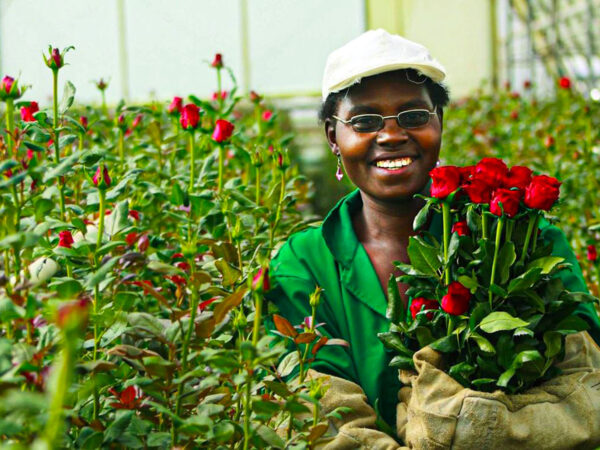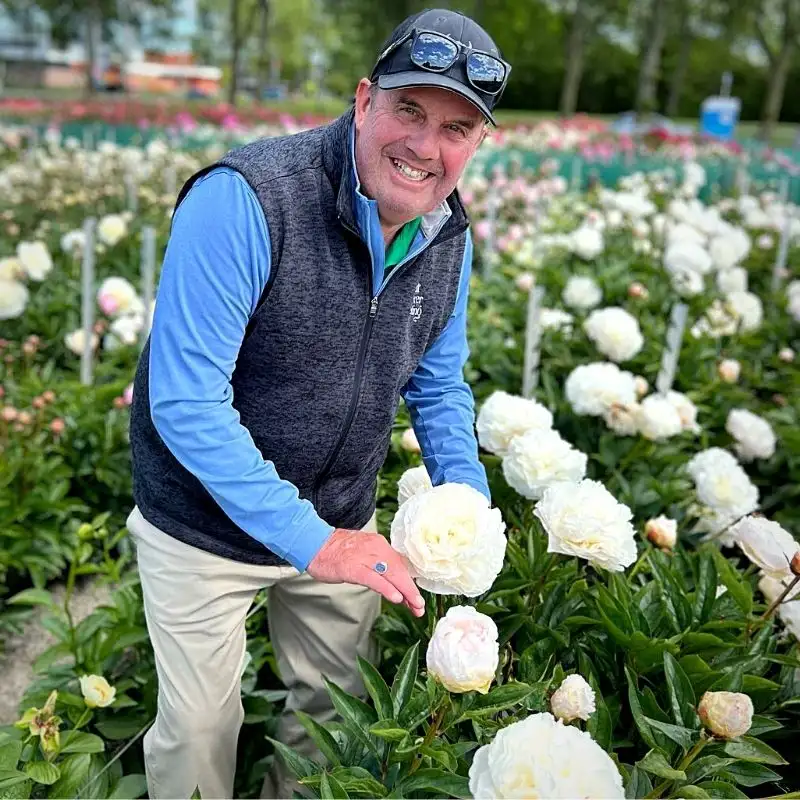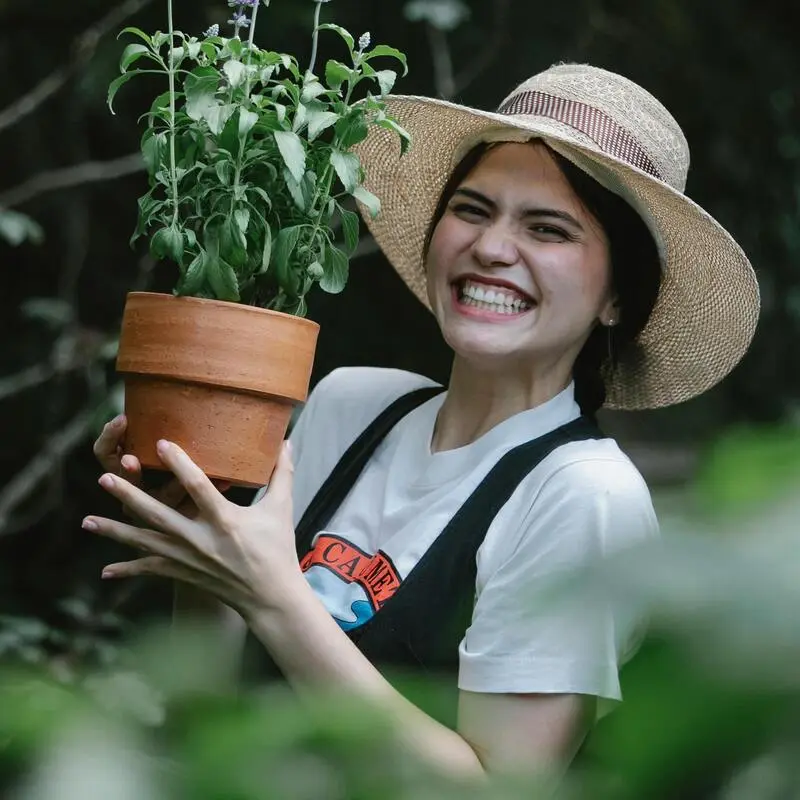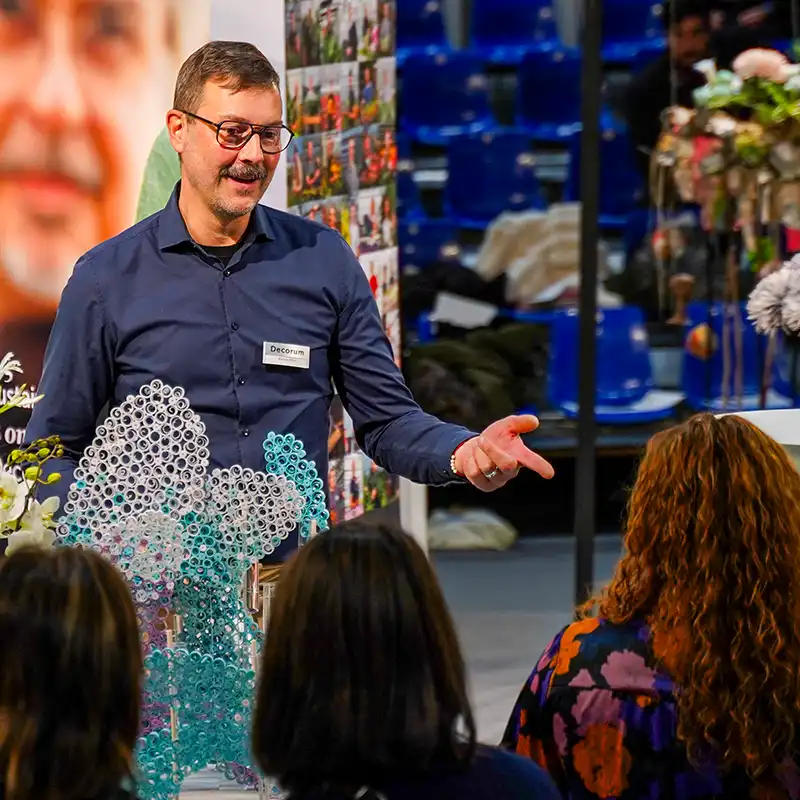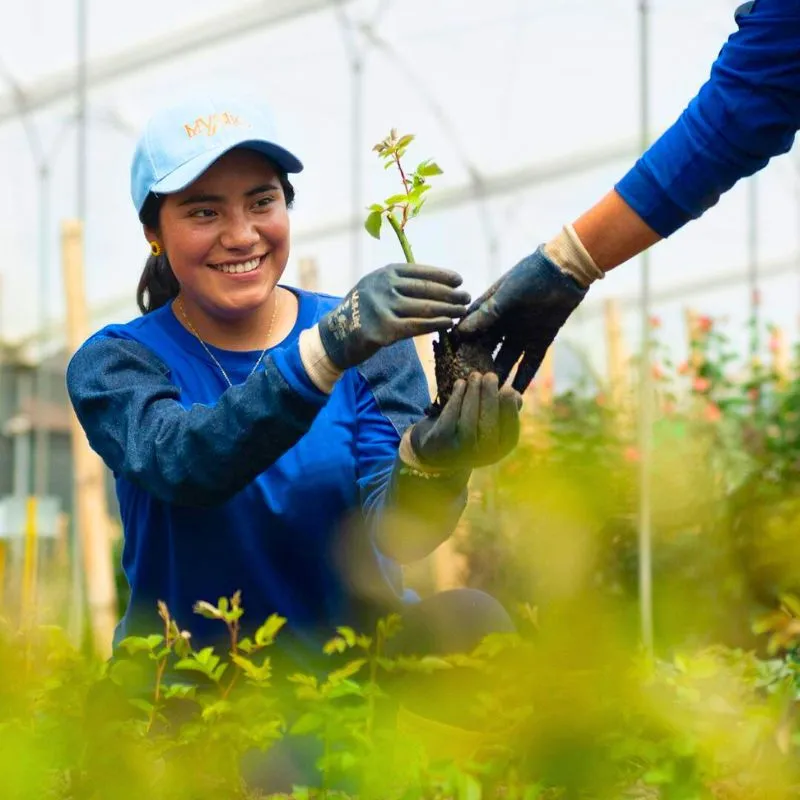We are living in a world that is now focused on sustainability - sustainable living, sustainable production, and sustainable partnerships which are in line with sustainable development goals. So, The Kenya Flower Council (KFC) Flowers and Ornamentals Sustainability Standard (FOSS) has a crucial role here. This is how KFC Focuses on Sustainability With FOSS.
Considering More Than Just Profits
The Kenya floriculture sub-sector cultivates environmentally aware businesses which consider more than just profits — businesses consider their impact on society and the environment, contributing to the health of the structure within which they operate thereby helping construct an environment in which these businesses can thrive. Kenyan flowers adhere to good agricultural practices stressing the four pillars of sustainability: Environmental stewardship, Social accountability, Economic growth, and good governance. 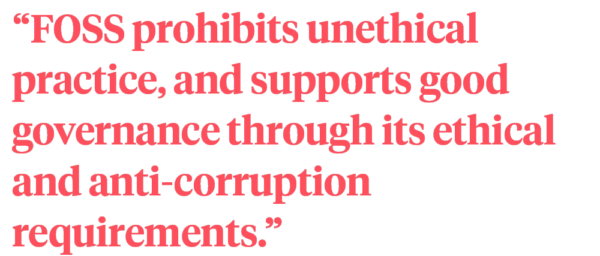
KFC Flowers and Ornamentals Sustainability Standard (FOSS)
KFC’s Flowers and Ornamentals Sustainability Standards (FOSS), popularly known as KFC Silver and Gold Standard. FOSS plays a critical role in ensuring sustainable and quality production of flowers in Kenya. The standard, to which all members of KFC must comply, is a trusted standard worldwide. It is one of only three internationally benchmarked standards that demonstrate sustainable social, environmental, and good agricultural practice benchmarks set by the EU-based Floriculture Sustainability Initiative (FSI). The standard encourages commitment to ethical practices, innovation, and promoting equitable trading practices, thus ensuring that certified producers foster sustainable, responsible, and safe production of cut flowers and ornamentals.
Sustainability With FOSS Aligned Globally
Growers and exporters are proud of the FOSS standard a significant marketing tool for the Kenyan cut flowers and ornamentals. The standard is globally recognized and aligned with the major global standards, therefore, it's all an exporter in Kenya needs to access the world market. Additionally, FOSS is benchmarked to the local standard the KS 1758 Part 1. The standard has enhanced the competitiveness of the Kenyan flower as it demonstrates that the flowers have been sustainably produced. A grower has to undergo a thorough robust auditing process to attain FOSS certification which includes making sure to have minimal or no adverse social and environmental impact or risk along with the farmer's production processes. Some of these best practices include water conservation by using water harvested from the greenhouse rooftops, use of closed hydroponic production systems where water is recycled, and reused. The use of drip irrigation systems ensures efficient water utilization. The standard also encourages growers to have constructed wetlands to take treat and test their wastewater in accredited laboratories before it is discharged to the environment. It also ensures that flower producers are socially responsible by providing terms and conditions of employment compliance with ILO Conventions; Wages and other remuneration are negotiated every two years between the flower growers and the Union, and availing employees of important social and health, and safety needs such as medical in hospitals within the workplace, transport to and from the workplace, training, and personal protective equipment. Many of the flower companies have gone beyond the FOSS requirements and are contributing through corporate social responsibility activities to their employees and the community with school fees; daycare crèches for kids, tree planting, drinking water among many others. FOSS prohibits unethical practice, and supports good governance through its ethical and anti-corruption requirements that require the producers to monitor their management systems on these vices.
Shared Value
KFC producer members have gone beyond compliance and are adding value to local communities - a philosophy that if local communities and employees are stronger, then businesses will be stronger. They are therefore creating partnerships and networks everywhere they operate – contributing to the growth of microeconomies, evident by the emergence of small retail ventures and transport services, and the knock-on effect is significant. Floriculture has been pivotal in opening and improvement of infrastructure to hitherto remote and desolate areas transport to millions of rural folks and integrating these areas in the national economic development. It also supports water projects and access to energy. The members build water pans for the communities’ livestock and water tanks for drinking and domestic use. Additionally, KFC members provide alternative livelihoods to their employees such as sewing courses, computer courses, and tailoring among others. These members provide schools, implemented school feeding programs, build dispensaries and hospitals, crèches to lactating mothers, construct social amenities and arrange for annual sports tournaments for their employees. They also provide loans to purchase domestic solar kits, home gas cylinders, bikes, and purchasing energy-saving stoves for employees. They also support local education through building dining halls, supplying new desks, hiring additional teachers, providing solar reading lights for pupils, giving trophies for academic performance, constructing toilets, purchasing science lab equipment, buying computers, and providing transport to deliver exam papers on behalf of the Ministry of Education.
KFC members also belong to their region's water catchment areas where they are members of the Water Resources User Association (WRUA). WRUA is a body that advocates legal water usage and proper water use. It carries out soil and water conservation practices within the critical catchment area and on riparian land. Water is a precious resource and KFC members are determined to use it sustainably in their production processes. In addition, they collect rainwater from their greenhouses, which can provide up to 50% of their annual needs. Kenya sits on the Equator and enjoys 12 hours of sunshine every day of the year. Therefore, most of the KFC members are gravitating towards investing in solar power for their daytime use. Their solar plants run their cold stores, pumps, and offices. Significantly reducing their carbon footprint, is not only good for the planet, but it’s also good for their bottom line in terms of cost and market access– a win-win.
Data Collection on Responsible Environment Practices
The FOSS audit captures data on five different levels that ensure the sustainability of flower production. An analysis is done on 5 criteria: Energy, Chemical Usage, Water, Fertilizer, and biological controls. It ensures that the only pesticides approved in Kenya and in the market are used and within the right quantities. 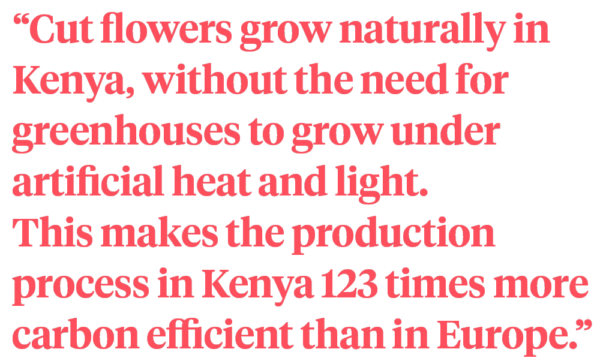
Carbon Efficiency
Food, flowers, and other agricultural products that are grown near the equator tend to have a lower carbon footprint than those produced locally under artificial conditions, studies have shown. Cut flowers grow naturally in Kenya, without the need for greenhouses to grow under artificial heat and light. This makes the production process in Kenya 123 times more carbon efficient than in Europe, according to numerous studies. Transportation of the Kenyan flowers is far more carbon-intensive and levels out the difference, but it’s still clear that Kenyan cut flower production is greenest: the entire process was calculated to be six times more carbon-efficient than Europe when transport was included. Exact figures from the study can be found in the table below, which show the CO2eq emissions from comparable flower farms:  Note: Emissions are based on a functional unit of 12,000 marketable cut stems and are shown as Global Warming Potential (GWP) expressed in kg of CO2 equivalents using the IPCC (2001) conversion factors. GWP and CO2 emissions from Kenya include the IPCC altitude factor. Source: The Dutch Ministry of Economic Affairs, Agriculture & Innovation (2012), who adapted the table from Edwards-Jones et al. (2008) with reference to Williams (2007).
Note: Emissions are based on a functional unit of 12,000 marketable cut stems and are shown as Global Warming Potential (GWP) expressed in kg of CO2 equivalents using the IPCC (2001) conversion factors. GWP and CO2 emissions from Kenya include the IPCC altitude factor. Source: The Dutch Ministry of Economic Affairs, Agriculture & Innovation (2012), who adapted the table from Edwards-Jones et al. (2008) with reference to Williams (2007).
Air Miles
When it comes to conscious consumerism, it helps to look beyond CO2 emissions to consider the wider impact of buying choices; demonstrated by the concept of ‘fair miles’. By buying products that greatly contribute to a country’s economy, consumers support development and poverty alleviation. Kenya’s horticulture sector accounts for a third of the country’s agricultural GDP and is one of the leading generators of the country’s foreign exchange. Over half a million people are employed by the floriculture sector, 100,000 of which are directly employed by the flower farms. This is estimated to impact the livelihoods of over 2 million Kenyans. The growth of this sector contributes significantly to the economy, holding the potential to boost GDP and increase living standards in the long term. Many of Kenya’s flower farms are regulated by the Kenya Flower Council (KFC), which ensures fair wages and working conditions as well as responsible use of natural resources and pesticides.
Tree Cover
KFC members have also invested heavily into the maintenance and development of trees and woodlots to achieve the country’s tree cover aim of 10%, with significant achievement. Most farms raise and sell tree seedlings, and try to motivate the next generation of Kenyans to carry out tree planting activities. They actively participate in catchment restoration activities. An example is the Payment for Environmental Services (PES) initiative, where smallholder farmers in the upper catchment in Nyandarua are paid tokens by the users of Lake Naivasha waters-comprising flower growers - to continue conserving and preserving the environment and ensure the flow of the Malewa River is maintained. The Malewa River is the main river that feeds Lake Naivasha. 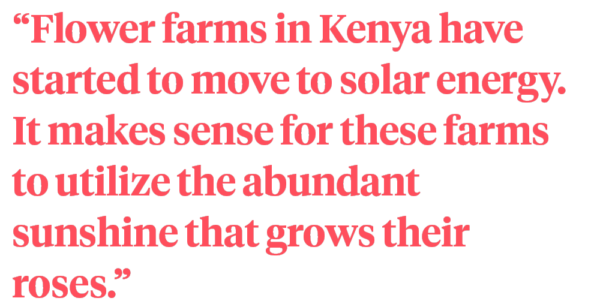
Kenyan Flower Farms Are Moving to Solar
While solar-powered flights are still just a glimmer on the horizon, flower farms in Kenya have started to move to solar energy, reducing production emissions even further. It makes sense for these farms to utilize the abundant sunshine that grows their roses to power their operations as well, and not only for environmental reasons. High energy prices are a well-known concern for flower farms, with energy bills often accounting for a large portion of a farm’s operational expenses. The Kenyan Energy Regulatory Commission just announced another electricity tariff increase that will affect flower farms with a >20% price increase. This hinders potential growth: the sector’s forecast growth rate of 5% p.a. over the next 5 years could be significantly higher, creating further benefits for the economy. This growth is also sustainable from the outset, powered by renewable energy. The movement is in its early stages, but interest is growing rapidly, as access to solar is facilitated by full-service solar companies such as ecoligo. So, next time you’re brightening up a room, a mood, or a day with beautiful flowers imported from Kenya, you can rest assured that the carbon footprint is as low as possible – and that you’re supporting jobs and development where it is needed. And if you’d like to have even more of an impact, you can invest in a solar project for one of the very farms your roses are grown at.
Conclusion
How KFC Focuses on Sustainability With FOSS, a mark of high quality. FOSS guarantees that the flowers are produced in a production process that is socially accountable and where the environment is protected and conserved. It ensures the provision of every aspect the employee welfare thereby enhancing the growth of the Kenyan flower industry which continues to play a critical role in the socio-economic development of the country. More information about FOSS and contacts at the Kenya Flower Council here. Header image by Marginpar.
Additional resources:
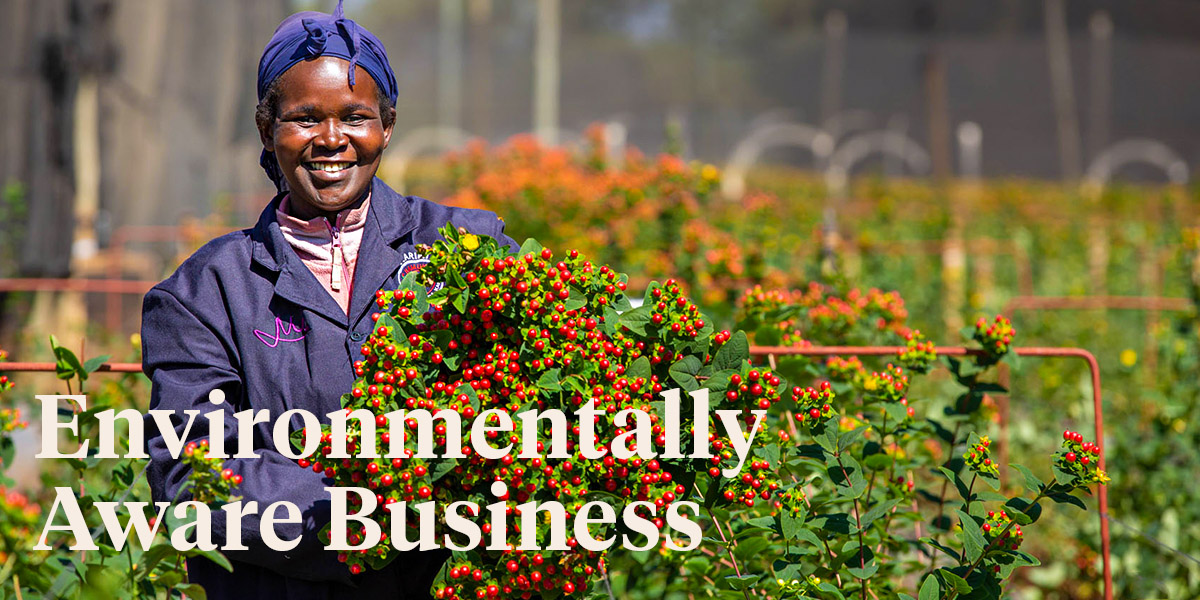
 Image by
Image by 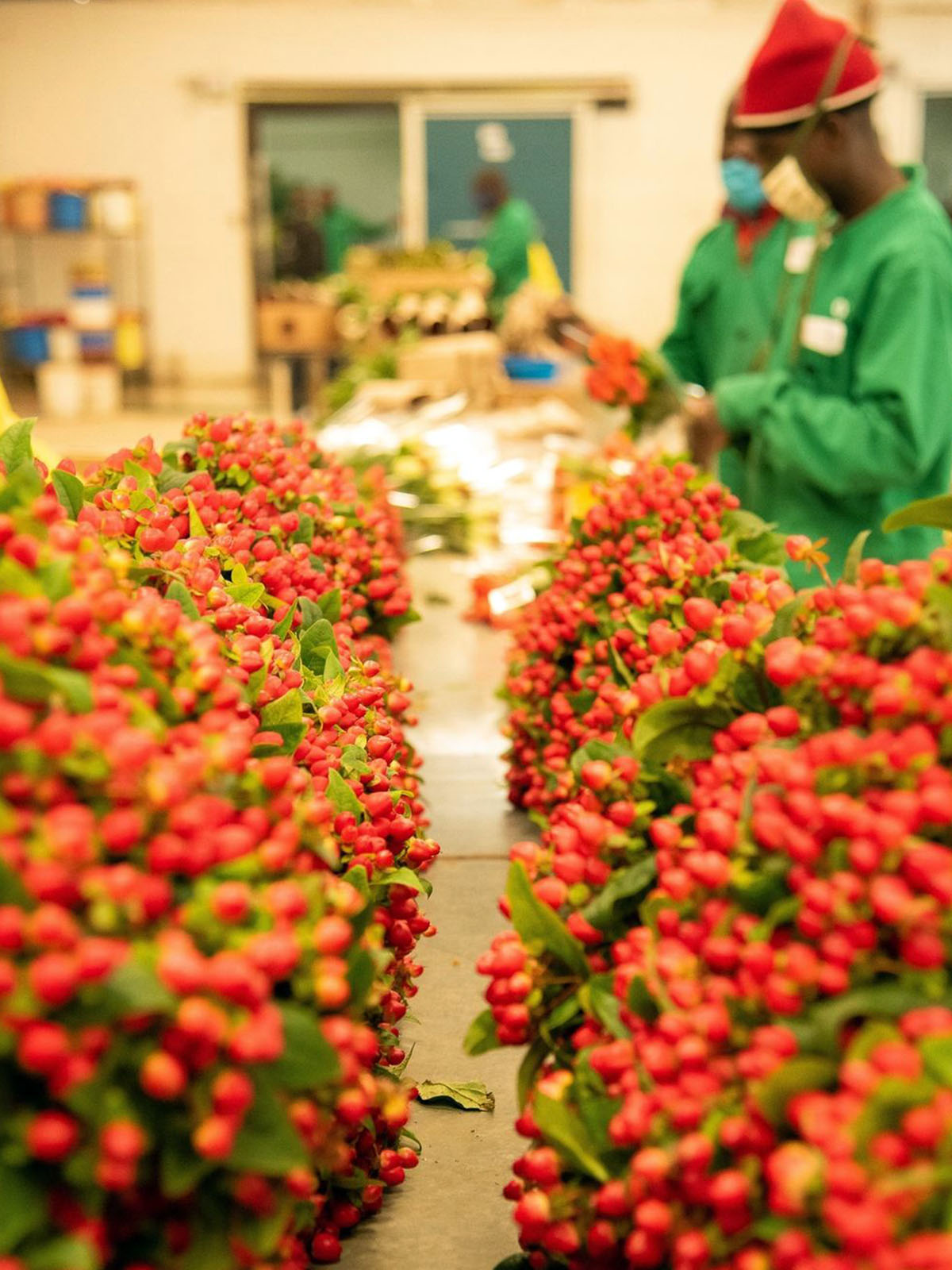
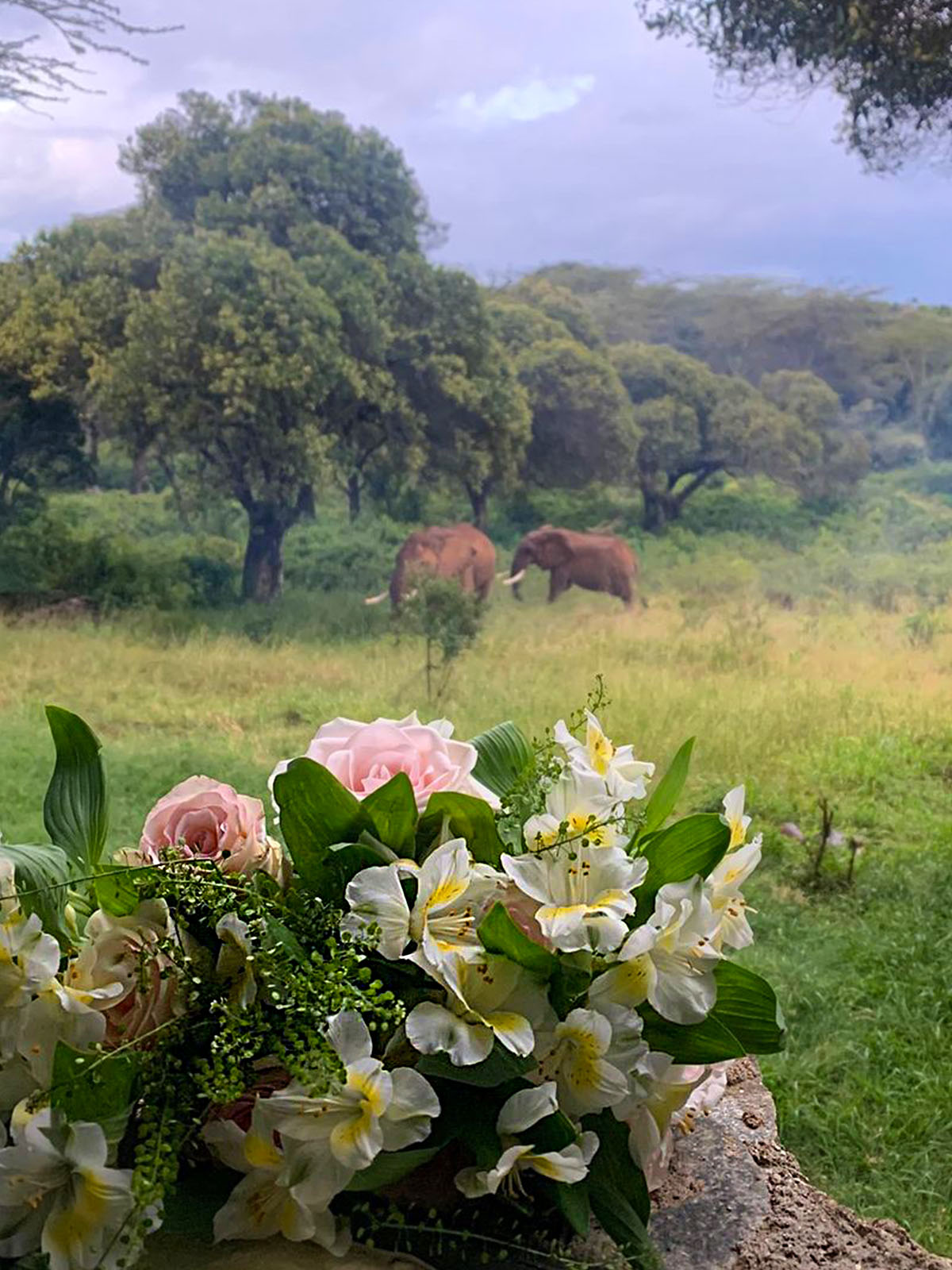
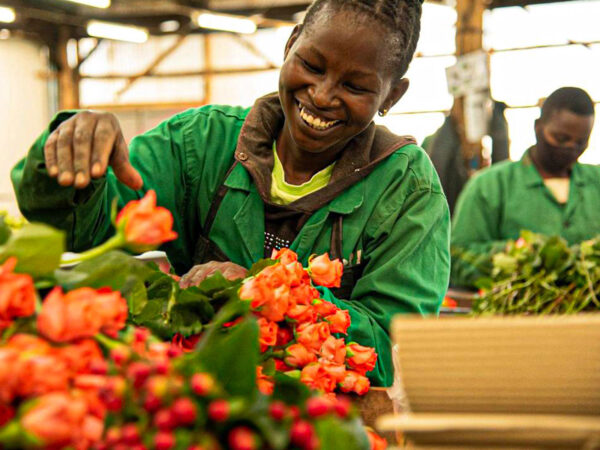 Image by
Image by 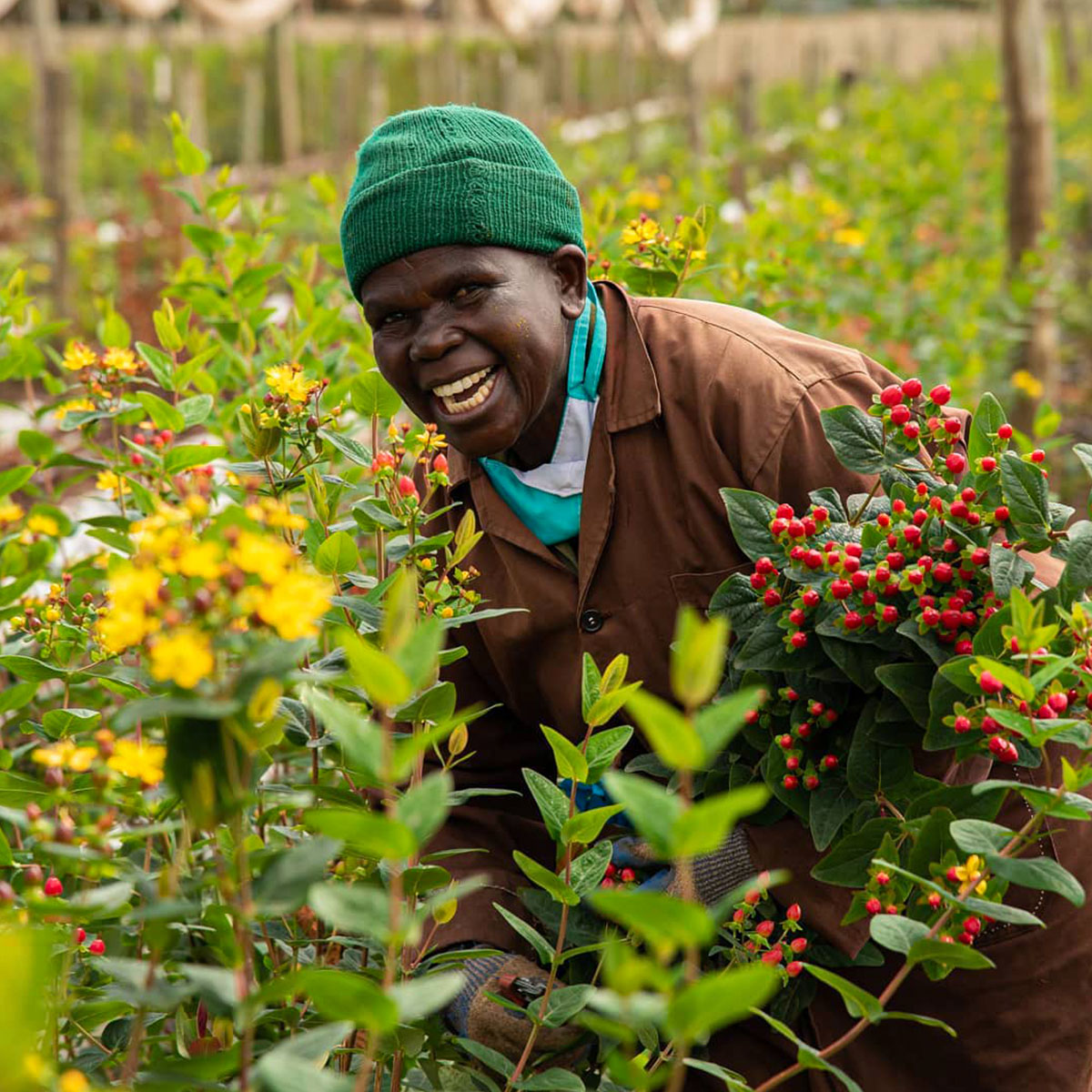
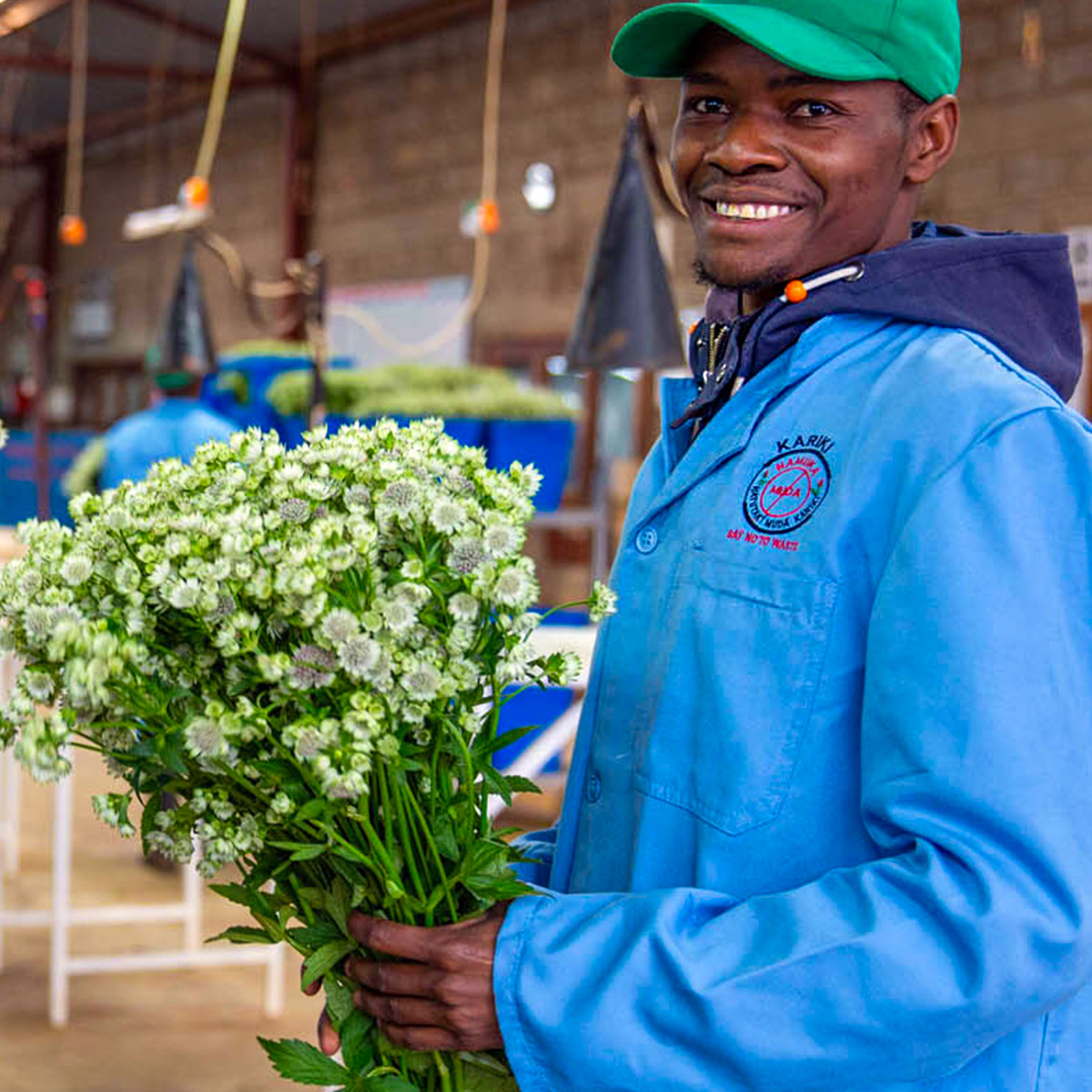
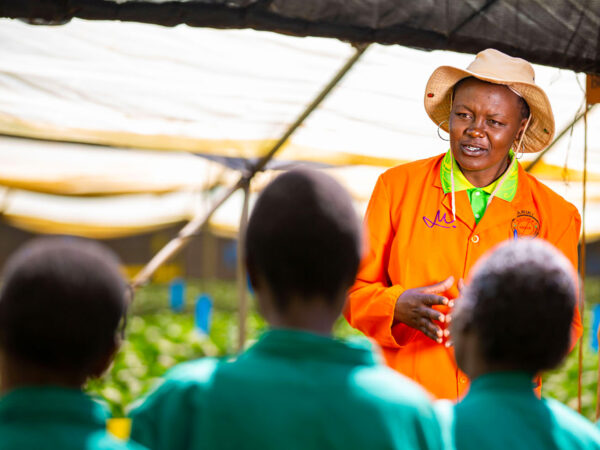 Image by
Image by 